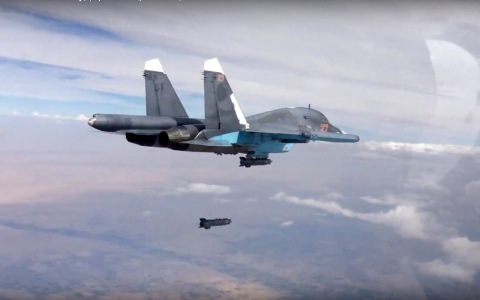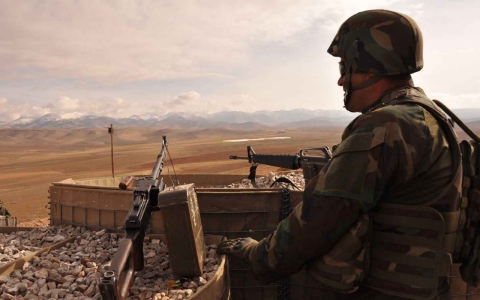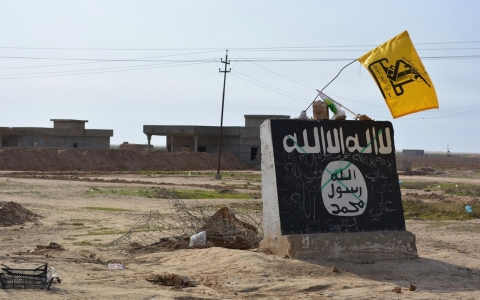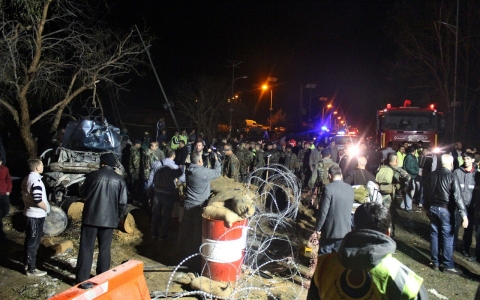Twin suicide attacks claimed by a group affiliated with ISIL have killed at least 43 people and injured more than 240 in a Shia suburb in southern Beirut, the Lebanese health minister has said.
Security officials say the explosions occurred in Ain el Sikkeh, next to the Burj el-Barajneh Palestinian refugee camp. The area, located off a main highway leading to Beirut's airport, is a well-known commercial and residential area in the capital's southern suburbs.
It is the deadliest such attack to hit Lebanon in over a year. Witnesses said that there were only minutes between the two blasts.
“I was standing outside my store with my friend when the first explosion happened,” one resident, who was injured in the explosion, told Al Jazeera.
“He was martyred in the explosion. As I was trying to move him, the second explosion happened.”
According to a Lebanese security official, the first suicide attacker detonated his explosives outside a Shia mosque, while the second blew himself up inside a nearby bakery.
An apparent third suicide attacker was found dead, his legs blown off while he still wore an intact explosives' belt, said the official, speaking on condition of anonymity. The official speculated the third might have been killed from the explosion of the second suicide attacker, as he was reportedly close to that blast.
Al-Mayadeen TV also reported there was a third would-be suicide attacker, describing him as a bearded young man who wore an explosives' belt. The report said he was killed before he was able to detonate the explosives. The Islamic State in Iraq and the Levant (ISIL) claimed responsibility for the attacks.
Hospitals in southern Beirut were calling on people to donate blood and appealed to residents not to gather at the hospital so that ambulance and emergency staff could work unhindered.
Shortly after the explosions, ambulances rushed to the scene and started evacuating the wounded and the dead as Lebanese troops and gunmen belonging to the Shia armed group Hezbollah cordoned off the area, preventing anyone from getting close.
“There is a massacre inside and we will not let you take photos,” a Hezbollah member screamed at an Associated Press photographer at the scene. An hour later, ambulance sirens could still be heard in Beirut streets.
Hezbollah also called on people to leave all coffee shops in the area, which are usually packed with people, and urged residents to inform the group about any suspicious activities.
Much of southern Beirut is a Hezbollah stronghold — and the area was hit by a string of deadly suicide explosions in 2014. Residents have long feared that Hezbollah's participation in Syria's civil war could spill over into Lebanon.
Hezbollah has sent hundreds of fighters to support Syrian President Bashar al-Assad's forces in the four-year-old conflict over the border. Government forces backed by Hezbollah and Iranian troops have intensified their fight against mostly Sunni insurgents, including ISIL, since Russia launched an air campaign in support of Assad on Sept. 30.
Beirut residents who talked to Al Jazeera expressed dismay that such deadly explosions were taking place in the southern suburbs again.
They said that they were concerned that there will be a return of the tense period of insecurity in which they lived under during the last string of bombings. Hezbollah had tightened security in the area in a bid to prevent such attacks.
The attacks drew a wave of condemnation across Lebanon's political spectrum, including some of Hezbollah's opponents.
Lebanese Prime Minister Tammam Salam condemned the attacks as "unjustifiable," and called for unity against "plans to create [sectarian] strife" in the country, urging officials to overcome their differences.
Al Jazeera and wire services

Analysis: With the arrival of Russian jets in Syria, possibility of an ISIL push on Lebanon seems remote for now

Lebanese troops fight largely overlooked battle in stark border mountains to keep ISIL and Syria’s war from pouring in

Iran-backed Shia militia plans assault on both sides of the border to dislodge ISIL, Jabhat Al-Nusra

Three dead in the third such attack in Hermel, as Syria's war continues to exacerbated sectarian tensions in Lebanon






Error
Sorry, your comment was not saved due to a technical problem. Please try again later or using a different browser.